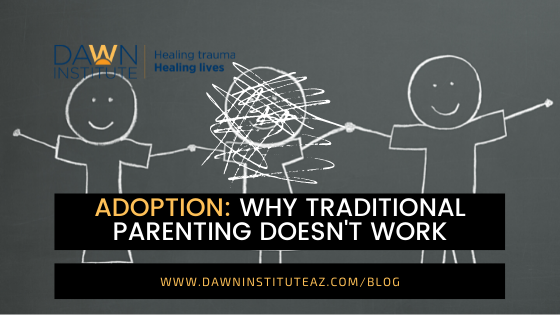When my (adopted) son was about four years old, he brought me a picture he had drawn of himself, my husband, and me. You know those super, sweet pictures kids draw of people that are really just a circle with limbs sticking out? That’s the kind. This memory stands out because it was pivotal moment for my husband and I. I wish I could say it was the moment we know he felt belonging in our family. The moment we knew he felt loved. The moment we knew… we had done a good job parenting him, basically.
This really was the moment we knew our parenting style wasn’t working for him. Let me give you the details of the picture. He was in the middle with my husband and I on either side. We were both smiling. He was not. In fact, his face was scribbled on. There are many inferences we can draw from this, but at that moment I knew that something wasn’t working.
Advice from the Pros
I must say, I am grateful that our societal understanding of child development and supportive parenting has come a long way. We’ve come from parenting advice from professionals that suggested holding babies spoiled them, children needed to be treated like adults, and pregnant mom’s should have a drink to take the edge off. WOW! I’m so glad we don’t buy into those philosophies anymore.
Traditional Parenting
But, traditional parenting still lingers. What do I mean by ‘traditional parenting?”
Traditional parenting encompasses a parenting style of cause (behavior) and effect (punishment), hierarchal rigidity, and black and white teaching. Many of the qualities of traditional parenting are well-intended and even important. Our children need to know cause and effect. They need to honor the parent-child hierarchy. And they need to understand that some rules are black and white. Because there can be so much good in the under-pinnings of this approach, it can work well for children whose parents are supportive and can hear the emotional needs of their kiddos.
Children who come from hard places (be that broken attachment, trauma, or substance exposure in the womb) have lacked nurturing support and neurological development. This makes traditional parenting ineffective.
Why It Doesn’t Work
Let me explain. When the brain develops, factors in the environment influence how it develops. For example, brain development is damaged by drugs, alcohol, and even high stress while in the womb. Regions of the brain can become damaged. Sometimes to the point of no repair. Guess what happens in the brain? Cause and effect.
The same is true for trauma. It can cause neurological damage even after birth. This leaves our children neurologically compromised. So, when we use traditional parenting approaches, these just are not effective and can cause frustration in the relationship, the most important part of our kiddos overcoming healing.
We punish or discipline. They don’t respond. We punish and discipline. They don’t respond. Eventually the relationship hinges on compliance and not connection.
I’m not saying that we should not discipline our children. What I am suggesting is that we need to wrap discipline in creativity and connection.
A Change in Strategy and Expectations
Let me return to the story of my son for a moment. This led my husband and me on a pursuit of understanding his needs. We learned he had been exposed to drugs and alcohol in the womb. We learned that because of this he could not understand cause and effect and he did not have the ability to obey rules when an authority was not present.
Our change in strategy: give him a “monitor” so that he did not have the opportunity to “break” rules by being outside of eyesight. Give him ways to take the perspective of others to encourage “cause and effect” neuropathways. “What do you think that was like for your sister when…”
We also had to change our expectations and know when to just let things go, because for him it was not willful misbehavior… it was a lack of capability.
We are at such an amazing time in history. We have a wealth of knowledge in understanding the needs of our kiddos (biological and adopted) and we live at time when innovation is encouraged. This is our opportunity to hold on to the traditions that matter (parent-child hierarchy, teaching our children values, connection) and be creative in how we get our kiddos to adulthood. Let’s think outside the box together.
Happy Adoption Month!
Do you have questions for Dr. Crystal? Feel free to contact her!

